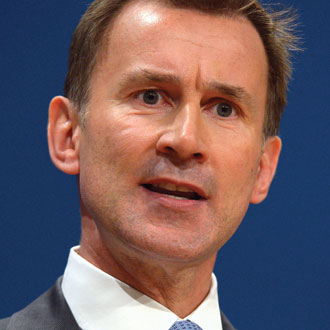Health secretary wants LESs to take forward GP ‘one-stop shop’ plans

Exclusive Health secretary Jeremy Hunt wants GP practices to be incentivised to become ‘one-stop shops’ for specialist outpatient services via local enhanced services, Pulse has learned.
The ‘one stop’ proposals, first floated by Mr Hunt in October, focus on long-term conditions management predominantly delivered in hospital outpatient settings, such as diabetes, renal and cardiology.
In a recent interview with Pulse, junior health minister David Mowat MP told Pulse that the national GP contract could be ‘a mechanism for GPs to be reimbursed’ for taking on specialist outpatients services.
But, asked by Pulse if this meant a new national Directed Enhanced Service (DES) was being proposed, a Department of Health spokesperson said: ‘[The] Secretary of state is thinking about local enhanced services, not a national scheme.’
And NHS England confirmed that it had ‘no plans’ for a new national DES on one-stop shops.
Meanwhile, GP leaders told Pulse that they have not come across any fleshed out proposal for the scheme at all, adding that at the moment it was just a ‘political statement’.
GPC chair Dr Chaand Nagpaul said: ‘It’s not something I’ve come across as a proposal, no. To me it’s a political statement and nothing more’.
NHS England chief executive Simon Stevens has previously told Pulse that GPs could be taking a lead role in managing ‘all of the -ologies’ from diabetes to cardiology.
DH and NHS England are hoping that some of the budget spent on outpatients – currently at the same level as general practice is its entirety – can be transferred to general practice as part of their Five Year Forward View strategy of moving services closer to patients’ homes and reduce the cost of secondary care.
A Pulse analysis of how one-stop shops were already working found models in Hampshire, where respiratory specialists are being invited to Saturday clinics at GP practices and drastically reduced emergency admissions.
Meanwhile, a scheme in Tower Hamlets in East London, where NHS England vanguard lead Sir Sam Everington is CCG chair, sees GPs able to email renal consultants directly, and in many cases avoid a referral altogether.
But in Pulse’s interview with Mr Mowat, the minister said GPs would not be able to become one-stop shops without a significant upgrade to GP premises.
More work for GPs?
Mr Hunt’s new ambition for GP practices to run outpatient clinics come as NHS England is in the process of developing a new voluntary GP contract for large-scale multidisciplinary GP practices with 30,000 or more patients, which aims for practices to employ a wider range of healthcare staff.
But it also comes as the GPC has been successful in convincing NHS leaders to amend hospital contracts to stop ‘workload dump’ from secondary care colleagues, amid unprecedented pressure on GP practices.
When first commenting on the plans, the GPC highlighted that many GP practices already do this – for example by caring for the vast majority of their diabetic patients. It further warned tha tthis workload shift tended to not be matched and supported by shifted resources.
Announcing his plan in October last year, Mr Hunt said that under his ‘GP one-stop programme’, the NHS will be going through ‘condition by condition’ to see which can be handled in general practice rather than secondary care going forward.
He admitted that this meant asking GPs to ‘do more work’ but said that they would be ‘paid for doing that’ and argued that it would also ‘make life more rewarding for doctors’.
Pulse October survey
Take our July 2025 survey to potentially win £1.000 worth of tokens











